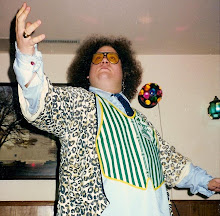By the blood of our ancestors
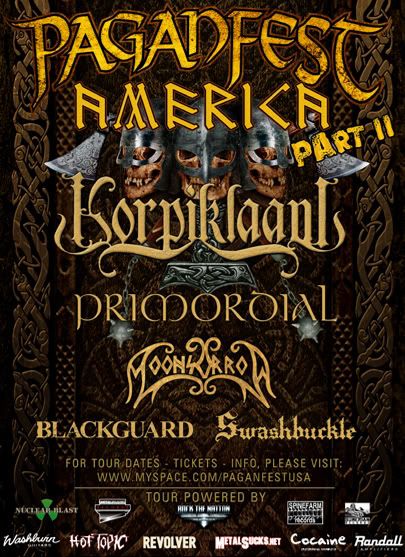 Tonight, the second Pagan Fest America tour stops in the Chicago area, once again serving as a pre-event teaser for Chicago Powerfest. Of course, Heathen Crusade remains the best single opportunity any average American fan of Viking/Celtic/etc. metal could enjoy, since even though there is something resembling a scene for the stuff coming into shape on these shores, we still don't have an opportunity to see the majority of these bands in the flesh. However, for the same fans, the Pagan Fest tour offers a fine mid-year recharge.
Tonight, the second Pagan Fest America tour stops in the Chicago area, once again serving as a pre-event teaser for Chicago Powerfest. Of course, Heathen Crusade remains the best single opportunity any average American fan of Viking/Celtic/etc. metal could enjoy, since even though there is something resembling a scene for the stuff coming into shape on these shores, we still don't have an opportunity to see the majority of these bands in the flesh. However, for the same fans, the Pagan Fest tour offers a fine mid-year recharge.As a tour rather than a one-off event, Pagan Fest necessarily skews more commercially because it needs to sustain audiences across a larger territory than a similar tour would typically cross in all of Europe. The experience is simply not as intimate or "underground." However, this year's Pagan Fest lineup includes two Heathen Crusade alumni, Primordial and Moonsorrow, both of whom are among my very favorite bands at this moment. Commercialism be damned, I'm celebrating.
In honor of the evening's spirit, this new playlist is a sequel to one I made prior to Heathen Crusade II. Go see that one for a more thorough discourse on the ethnic metal phenomenon. Here, you'll find twenty completely different bands from last time, although the model is similar: the first three bands have played the North American version of the Pagan Fest tour, bands four through eight performed at past Heathen Crusades and bands nine through twenty are a sample of interesting stuff I've found on my journeys through the dusty halls of pancultural metal. (Sorry, no Irish metal, there was plenty of that on the last playlist.) I imagine I'll get around to a third installment of this someday, so I hope you enjoy.
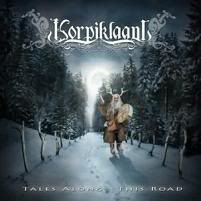 1. Korpiklaani, "Kirki" (Tales Along This Road, Napalm, 2006, Finland) - Finland has bred many of folk metal's popular acts, including this year's Pagan Fest headliners, Korpiklaani (meaning "forest clan"). With a generally uptempo take on Finnish folk tropes and song titles such as "Wooden Pints," "Beer Beer," "Happy Little Boozer" and "Let's Drink," they're one of the genre's most jovial and accessible attractions, and rightly so. Despite their alcohol-loving levity, Korpiklaani has a greater claim to cultural relevance than many of their peers, since frontman Jonne Järvelä started off playing folk music and gradually moved toward metal. Järvelä's previous incarnation of Korpiklaani, Shaman, was known for incorporating traditional Sami chant-singing called yoik. He still pulls it out once in a while, although not on this tune, a boisterous ode to summertime horniness.
1. Korpiklaani, "Kirki" (Tales Along This Road, Napalm, 2006, Finland) - Finland has bred many of folk metal's popular acts, including this year's Pagan Fest headliners, Korpiklaani (meaning "forest clan"). With a generally uptempo take on Finnish folk tropes and song titles such as "Wooden Pints," "Beer Beer," "Happy Little Boozer" and "Let's Drink," they're one of the genre's most jovial and accessible attractions, and rightly so. Despite their alcohol-loving levity, Korpiklaani has a greater claim to cultural relevance than many of their peers, since frontman Jonne Järvelä started off playing folk music and gradually moved toward metal. Järvelä's previous incarnation of Korpiklaani, Shaman, was known for incorporating traditional Sami chant-singing called yoik. He still pulls it out once in a while, although not on this tune, a boisterous ode to summertime horniness.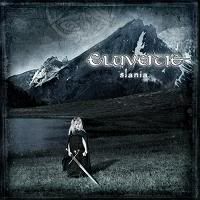 2. Eluveitie, "The Somber Lay" (Slania, Nuclear Blast, 2008, Switzerland) - Helvetians were a Celtic tribe that settled near the Alps in what is now known as Switzerland. Therefore, it's not a surprise to hear a Celtic lilt in the music of Eluveitie, whose name is Etruscan for "Helvetian" and have been known to sing in obsolete Gaulish. Fiddle, pipes and whistles appear, and Eluveitie is the only metal band I'm aware of that has a full-time hurdy gurdy player. The group's second album blew up last year, the material strangely bearing a strong influence from melodic death metal legends Dark Tranquillity, as if the aged Swedes swapped their futuristic keyboard textures for folk instruments. They were originally set to return to this year's Pagan Fest after winning a lot of fans at the last one, but have dropped off since the initial announcement. They also just put out the first of two acoustic albums planned for release this year.
2. Eluveitie, "The Somber Lay" (Slania, Nuclear Blast, 2008, Switzerland) - Helvetians were a Celtic tribe that settled near the Alps in what is now known as Switzerland. Therefore, it's not a surprise to hear a Celtic lilt in the music of Eluveitie, whose name is Etruscan for "Helvetian" and have been known to sing in obsolete Gaulish. Fiddle, pipes and whistles appear, and Eluveitie is the only metal band I'm aware of that has a full-time hurdy gurdy player. The group's second album blew up last year, the material strangely bearing a strong influence from melodic death metal legends Dark Tranquillity, as if the aged Swedes swapped their futuristic keyboard textures for folk instruments. They were originally set to return to this year's Pagan Fest after winning a lot of fans at the last one, but have dropped off since the initial announcement. They also just put out the first of two acoustic albums planned for release this year.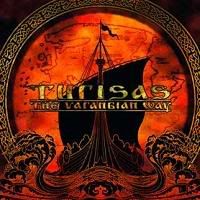 3. Turisas, "In the Court of Jarisleif" (The Varangian Way, Century Media, 2007, Finland) - Another participant of the previous Pagan Fest, Turisas (not to be confused with underrated Belgians Thurisaz) offer a crowd-pleasing variety of Viking metal, complete with English lyrics and rousing sing-along choruses. The lyrics of their second album focus on the Varangians, Vikings who sailed an eastern trade route from Scandinavia through Baltic and Byzantine lands, with each song reflecting a different point on the journey. "In the Court of Jarisleif" is the mid-album party that occurs when they get to the seat of Slavic power, held by genial host Yaroslav the Wise... I have to admit, I like this band, but I was unexpectedly and truly blown away by Turisas' airing of this lively, complex tune at the first Pagan Fest. They're quite the performers.
3. Turisas, "In the Court of Jarisleif" (The Varangian Way, Century Media, 2007, Finland) - Another participant of the previous Pagan Fest, Turisas (not to be confused with underrated Belgians Thurisaz) offer a crowd-pleasing variety of Viking metal, complete with English lyrics and rousing sing-along choruses. The lyrics of their second album focus on the Varangians, Vikings who sailed an eastern trade route from Scandinavia through Baltic and Byzantine lands, with each song reflecting a different point on the journey. "In the Court of Jarisleif" is the mid-album party that occurs when they get to the seat of Slavic power, held by genial host Yaroslav the Wise... I have to admit, I like this band, but I was unexpectedly and truly blown away by Turisas' airing of this lively, complex tune at the first Pagan Fest. They're quite the performers.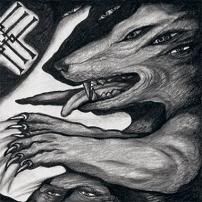 4. Metsatöll, "Veelind" (Iivakivi, Nailboard, 2008, Estonia) - This quartet was the highlight of HCIII for me. I'd never seen any type of band from Estonia, let alone a metal band. Metsatöll's style reminds me somewhat of the Faroe Islands' Týr, as their blend of traditional folk and metal also chugs away on untraditional rhythms, but these dudes are rougher and utilize folk instruments such as a flute and an Estonian bagpipe called a torupill. The bass is typically quite thick, a nice Viking-ish touch that connects the Estonians to their Scandinavian neighbors across the gulf. On this tune from their latest album, the group demonstrates their fondness for regilaul (a cappella Estonian folk singing) and lyrics reflecting cultural tales. The title means "Birds from Water."
4. Metsatöll, "Veelind" (Iivakivi, Nailboard, 2008, Estonia) - This quartet was the highlight of HCIII for me. I'd never seen any type of band from Estonia, let alone a metal band. Metsatöll's style reminds me somewhat of the Faroe Islands' Týr, as their blend of traditional folk and metal also chugs away on untraditional rhythms, but these dudes are rougher and utilize folk instruments such as a flute and an Estonian bagpipe called a torupill. The bass is typically quite thick, a nice Viking-ish touch that connects the Estonians to their Scandinavian neighbors across the gulf. On this tune from their latest album, the group demonstrates their fondness for regilaul (a cappella Estonian folk singing) and lyrics reflecting cultural tales. The title means "Birds from Water."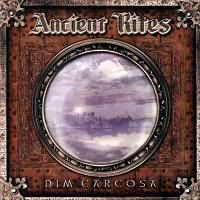 5. Ancient Rites, "Victory or Valhalla (Last Man Standing)" (Dim Carcosa, Hammerheart, 2001, Belgium) - This long-running Belgian group is often forgotten among the hordes of culturally-influenced metal groups out there today. They actually started as a black metal band 19 years ago, shifting focus to tales of history and bygone warfare with their 1998 album Fatherland. Though they occasionally pay tribute to their Flemish roots, Ancient Rites doesn't really play anything that's endemically "Belgian." Instead, they focus on pan-European pre-Christian themes, as heard in this grandiose Norse-themed corker. In conjunction with their increasingly melodic, epic material, they're emblematic of the Heathen Crusade's ideals, so it was nice to see them welcomed as headliners of the third one last November.
5. Ancient Rites, "Victory or Valhalla (Last Man Standing)" (Dim Carcosa, Hammerheart, 2001, Belgium) - This long-running Belgian group is often forgotten among the hordes of culturally-influenced metal groups out there today. They actually started as a black metal band 19 years ago, shifting focus to tales of history and bygone warfare with their 1998 album Fatherland. Though they occasionally pay tribute to their Flemish roots, Ancient Rites doesn't really play anything that's endemically "Belgian." Instead, they focus on pan-European pre-Christian themes, as heard in this grandiose Norse-themed corker. In conjunction with their increasingly melodic, epic material, they're emblematic of the Heathen Crusade's ideals, so it was nice to see them welcomed as headliners of the third one last November.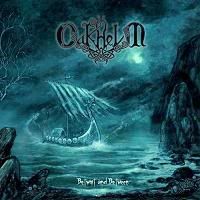 6. Oakhelm, "These Boundaries Crossed" (Betwixt and Between, Forest Moon, 2007, United States) - Although HCIII didn't have the insane international presence of the previous installment, the completion of the bill with so many American bands did not leave the audience wanting for appropriate or enjoyable acts. Take Portland, Oregon's Oakhelm, the Northwest's woodsiest band this side of Agalloch and Wolves in the Throne Room (both of whom would also be excellent musical and ideological fits at the fest, but are probably too cool for it). It's interesting that this band was formed by guys with backgrounds in the grind, sludge, experimental and "indie black metal" scenes. With just one album to their name, Oakhelm probably didn't bring too many people through the door themselves, but their combination of intense black metal attack and rousing Viking guitar melodies went over perfectly. This track shows off their occasional Celtic and acoustic passages, a suitably earthy introduction to their fierce yet epic approach.
6. Oakhelm, "These Boundaries Crossed" (Betwixt and Between, Forest Moon, 2007, United States) - Although HCIII didn't have the insane international presence of the previous installment, the completion of the bill with so many American bands did not leave the audience wanting for appropriate or enjoyable acts. Take Portland, Oregon's Oakhelm, the Northwest's woodsiest band this side of Agalloch and Wolves in the Throne Room (both of whom would also be excellent musical and ideological fits at the fest, but are probably too cool for it). It's interesting that this band was formed by guys with backgrounds in the grind, sludge, experimental and "indie black metal" scenes. With just one album to their name, Oakhelm probably didn't bring too many people through the door themselves, but their combination of intense black metal attack and rousing Viking guitar melodies went over perfectly. This track shows off their occasional Celtic and acoustic passages, a suitably earthy introduction to their fierce yet epic approach.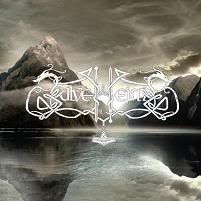 7. Ulveheim, "Ulvekrigerne" (For Ære Heder og Fedreland, Asenath, 2007, Mexico) - Looking at the cover art, band name, album/song titles, you would never guess Ulveheim is from Mexico. So complete is the quartet's absorption of the classic Viking metal vibe, that would not change once you heard them, either. While they bring absolutely nothing new to the oaken table (I hear early Vintersorg and especially Mithotyn in there), they are very good stylists. Their demo, which was picked up for release by a little Mexican metal label, is Ulveheim's sole recorded work to date, and it unfortunately does not come close to capturing the rousing energy of their performance at the most recent Heathen Crusade. This is the opening track, which includes a nice atmospheric section in the vein of Ulver's folkloric days. The title means "Wolf War" or something like that.
7. Ulveheim, "Ulvekrigerne" (For Ære Heder og Fedreland, Asenath, 2007, Mexico) - Looking at the cover art, band name, album/song titles, you would never guess Ulveheim is from Mexico. So complete is the quartet's absorption of the classic Viking metal vibe, that would not change once you heard them, either. While they bring absolutely nothing new to the oaken table (I hear early Vintersorg and especially Mithotyn in there), they are very good stylists. Their demo, which was picked up for release by a little Mexican metal label, is Ulveheim's sole recorded work to date, and it unfortunately does not come close to capturing the rousing energy of their performance at the most recent Heathen Crusade. This is the opening track, which includes a nice atmospheric section in the vein of Ulver's folkloric days. The title means "Wolf War" or something like that.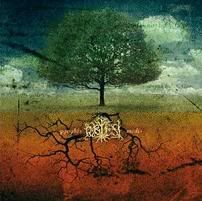 8. Obtest, "Àþuolas" (Gyvybës Medis, Osmose, 2008, Lithuania) - Here is one of many bands that made 2007's Heathen Crusade II such a benchmark of multicultural discovery. Hailing from the country which they proudly claimed was the last in Europe to be Christianized, Obtest is one of those underground European acts that sounds familiar and intangibly foreign at once. Their style is somewhere between black metal and the traditional type, resulting in catchy refrains, frantic tempos and more ragged edges than you typically get with metal this unabashedly melodic. Furthermore, these melodies aren't the same ones you've heard on a million ethno-metal CDs inspired by Scandinavia or the British Isles. Obtest's guitar tone is often harsh but triumphant and the native tongue vocals are delivered with an enthusiastic coarseness that is completely comprehendible, provided you speak Lithuanian. The title of this high-velocity ditty from their fourth full-length means "Oak."
8. Obtest, "Àþuolas" (Gyvybës Medis, Osmose, 2008, Lithuania) - Here is one of many bands that made 2007's Heathen Crusade II such a benchmark of multicultural discovery. Hailing from the country which they proudly claimed was the last in Europe to be Christianized, Obtest is one of those underground European acts that sounds familiar and intangibly foreign at once. Their style is somewhere between black metal and the traditional type, resulting in catchy refrains, frantic tempos and more ragged edges than you typically get with metal this unabashedly melodic. Furthermore, these melodies aren't the same ones you've heard on a million ethno-metal CDs inspired by Scandinavia or the British Isles. Obtest's guitar tone is often harsh but triumphant and the native tongue vocals are delivered with an enthusiastic coarseness that is completely comprehendible, provided you speak Lithuanian. The title of this high-velocity ditty from their fourth full-length means "Oak."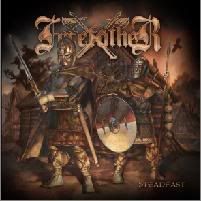 9. Forefather, "Hallowed Halls" (Steadfast, Seven Kingdoms, 2008, United Kingdom) - Underheralded due to sporadic releases, but beloved by anyone in the know, Forefather is easily the most galvanizing English pagan metal band since the legendary Sabbat. Formed by two brothers disinterested in live performance, these stalwarts of self-described Anglo-Saxon metal remain a studio-bound duo, utilizing a drum machine that sounds more convincing than some bands' real drums (see: Ancient Rites). Their music has recognizable black and power metal traits, but is ultimately its own bold statement of heathen pride. Forefather is one of many bands who got screwed by the ugly dissolution of Karmageddon Media, and they remain unsigned, self-releasing an impressive album last year. A taster from that disc, the lyrics of this typically exultant Forefather number reflect the cultural significance of meoduselds, Anglo-Saxon mead halls.
9. Forefather, "Hallowed Halls" (Steadfast, Seven Kingdoms, 2008, United Kingdom) - Underheralded due to sporadic releases, but beloved by anyone in the know, Forefather is easily the most galvanizing English pagan metal band since the legendary Sabbat. Formed by two brothers disinterested in live performance, these stalwarts of self-described Anglo-Saxon metal remain a studio-bound duo, utilizing a drum machine that sounds more convincing than some bands' real drums (see: Ancient Rites). Their music has recognizable black and power metal traits, but is ultimately its own bold statement of heathen pride. Forefather is one of many bands who got screwed by the ugly dissolution of Karmageddon Media, and they remain unsigned, self-releasing an impressive album last year. A taster from that disc, the lyrics of this typically exultant Forefather number reflect the cultural significance of meoduselds, Anglo-Saxon mead halls.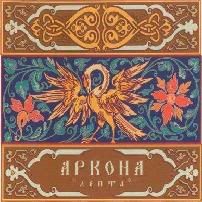 10. Аркона, "Выйду я на волюшку" (Лепта, Sound Age, 2004, Russia) - The Russian folk metal scene is fairly rich with talent, although many outfits push the nasty type of political angle one must unfortunately suspect from culturally-conscious metal of the former Eastern Bloc. Add Cyrillic script to the non-English mix, and you've got a listener barrier that can only be overcome by outstanding music. One of the most justly prominent Russian acts is Arkona, named after the last city-castle stronghold of Slavic paganism, which distinguishes its black/power/folk metal vision with winsome keyboard-driven harmonies and versatile vocalist Masha "Scream" Arhipova. She has a decent harsh rasp, but you'll only hear her affecting folk-style singing on this jubilant tune, which is precisely the sort of day-brightener that makes you wish you could speak a dozen languages. It's from their second album, Lepta, and its title transliterates as "Vyidu ya na Volushky," or "I'll Come to the Free Lands."
10. Аркона, "Выйду я на волюшку" (Лепта, Sound Age, 2004, Russia) - The Russian folk metal scene is fairly rich with talent, although many outfits push the nasty type of political angle one must unfortunately suspect from culturally-conscious metal of the former Eastern Bloc. Add Cyrillic script to the non-English mix, and you've got a listener barrier that can only be overcome by outstanding music. One of the most justly prominent Russian acts is Arkona, named after the last city-castle stronghold of Slavic paganism, which distinguishes its black/power/folk metal vision with winsome keyboard-driven harmonies and versatile vocalist Masha "Scream" Arhipova. She has a decent harsh rasp, but you'll only hear her affecting folk-style singing on this jubilant tune, which is precisely the sort of day-brightener that makes you wish you could speak a dozen languages. It's from their second album, Lepta, and its title transliterates as "Vyidu ya na Volushky," or "I'll Come to the Free Lands."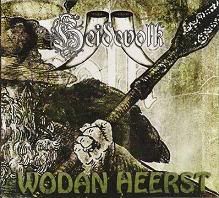 11. Heidevolk, "Wodan Heerst" (Wodan Heerst, self-released, 2007, Netherlands) - As an English speaker, I find something charming about the Dutch language, in which Heidevolk's two lead vocalists exclusively sing. Their warm vocal harmonies, along with a combination of wistful violin and shifting Viking gallop-riffs, provide the sextet's rollicking songs with a pastoral intimacy. Lyrically, Heidevolk (meaning "folk of the heathland") is primarily concerned with the cultural and spiritual history of Gelderland, the largest province in the Netherlands and ancient home of Germanic tribes such as the Frisians, Batavians, Saxons and Franks. This is the original version of "Wodan Heerst" ("Wodan Prevails"), which was re-recorded for last year's Walhalla Wacht. This band deserves to be better known, as their sound is entirely accessible, yet unique.
11. Heidevolk, "Wodan Heerst" (Wodan Heerst, self-released, 2007, Netherlands) - As an English speaker, I find something charming about the Dutch language, in which Heidevolk's two lead vocalists exclusively sing. Their warm vocal harmonies, along with a combination of wistful violin and shifting Viking gallop-riffs, provide the sextet's rollicking songs with a pastoral intimacy. Lyrically, Heidevolk (meaning "folk of the heathland") is primarily concerned with the cultural and spiritual history of Gelderland, the largest province in the Netherlands and ancient home of Germanic tribes such as the Frisians, Batavians, Saxons and Franks. This is the original version of "Wodan Heerst" ("Wodan Prevails"), which was re-recorded for last year's Walhalla Wacht. This band deserves to be better known, as their sound is entirely accessible, yet unique.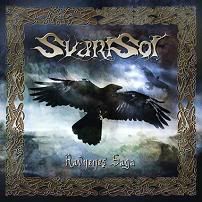 12. Svartsot, "Jotunheimsfærden" (Ravnenes Saga, Napalm, 2007, Denmark) - Sure, there was Mercyful Fate, but in the Scandinavian black metal races, Denmark was pretty much left behind by Norway, Sweden and Finland. Danish folk metal isn't exactly thriving, either, but relative newcomers Svartsot stand out with a strong debut bolstered by flute, mandolin, bodhrán and, most distinctively, deep death metal growls, which you don't often hear in the genre. They're another fine discovery of Napalm Records, formerly famous for a string of goth metal snoozers with "blood n' boobs" cover art (you know the type), but now an ever-growing haven for such folk/pagan metal favorites as Týr, Korpiklaani, Arkona and Heidevolk, along with Viking vets like Falkenbach, Vintersorg and Kampfar. This jaunty song, inspired by mythology, describes a journey to the land of the giants to borrow a vat in which to brew beer for all the gods.
12. Svartsot, "Jotunheimsfærden" (Ravnenes Saga, Napalm, 2007, Denmark) - Sure, there was Mercyful Fate, but in the Scandinavian black metal races, Denmark was pretty much left behind by Norway, Sweden and Finland. Danish folk metal isn't exactly thriving, either, but relative newcomers Svartsot stand out with a strong debut bolstered by flute, mandolin, bodhrán and, most distinctively, deep death metal growls, which you don't often hear in the genre. They're another fine discovery of Napalm Records, formerly famous for a string of goth metal snoozers with "blood n' boobs" cover art (you know the type), but now an ever-growing haven for such folk/pagan metal favorites as Týr, Korpiklaani, Arkona and Heidevolk, along with Viking vets like Falkenbach, Vintersorg and Kampfar. This jaunty song, inspired by mythology, describes a journey to the land of the giants to borrow a vat in which to brew beer for all the gods.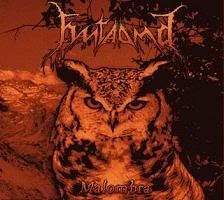 13. Hantaoma, "Malombra" (Malombra, Holy, 2005, France) - Hantaoma is a side project of medieval neofolk duo Stille Volk, whose first album was named Hantaoma, after a malevolent spirit of Pyrenean folklore. Yes, this outfit's specific inspiration is the ancient culture of the Pyrenees mountain region (parts of France, Spain and Italy), with lyrics in Occitan. If that sounds exotic, wait until you hear the music, a wondrous clash of bagpipes, flute, fiddle, mandolin, bouzouki, shawm and bombarde with melodic, galloping black metal. Such a range of instruments might overwhelm as a gimmick if the songs were not as forthright and engaging as Hantaoma's are. Although thoroughly excellent and addictive, their debut isn't very well known, even if it's already inspired the formation of at least one other Occitan metal group.
13. Hantaoma, "Malombra" (Malombra, Holy, 2005, France) - Hantaoma is a side project of medieval neofolk duo Stille Volk, whose first album was named Hantaoma, after a malevolent spirit of Pyrenean folklore. Yes, this outfit's specific inspiration is the ancient culture of the Pyrenees mountain region (parts of France, Spain and Italy), with lyrics in Occitan. If that sounds exotic, wait until you hear the music, a wondrous clash of bagpipes, flute, fiddle, mandolin, bouzouki, shawm and bombarde with melodic, galloping black metal. Such a range of instruments might overwhelm as a gimmick if the songs were not as forthright and engaging as Hantaoma's are. Although thoroughly excellent and addictive, their debut isn't very well known, even if it's already inspired the formation of at least one other Occitan metal group.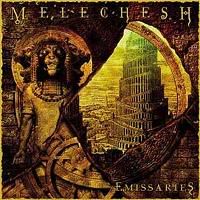 14. Melechesh, "Rebirth of the Nemesis" (Emissaries, Osmose, 2006, Israel) - Metal riffs with Arabian flavors go back to Jimmy Page, and have been a mainstay ever since. It's only within the past decade or so that we have seen a rise of bands using Arabian music to reflect their genuine heritage. One of the best-known is Melechesh, originally founded in Jerusalem to play raw black metal with Middle Eastern influence in their guitar scales and drum patterns, drawing lyrics from Mesopotamian and Sumerian mythology. Their first album, which, coincidentally, was released in 1996 by an American black metal legend my girlfriend used to hang out with, was called As Jerusalem Burns... Al'Intisar (Arabic for "The Victory"). You can imagine how well that went over in their homeland. The Armenian/Assyrian and Palestinian guitarists attracted so much attention from Israeli authorities that they eventually relocated Melechesh to the Netherlands in the late 1990s. With American and Dutch drummers, they've since sharpened their sound into a bracing black/death/thrash assault with impeccable musicianship and ever-increasing traditional sounds. This intense opening salvo from their last disc hails the return of Babylonian sea goddess Tiamat and the annihilation she symbolizes.
14. Melechesh, "Rebirth of the Nemesis" (Emissaries, Osmose, 2006, Israel) - Metal riffs with Arabian flavors go back to Jimmy Page, and have been a mainstay ever since. It's only within the past decade or so that we have seen a rise of bands using Arabian music to reflect their genuine heritage. One of the best-known is Melechesh, originally founded in Jerusalem to play raw black metal with Middle Eastern influence in their guitar scales and drum patterns, drawing lyrics from Mesopotamian and Sumerian mythology. Their first album, which, coincidentally, was released in 1996 by an American black metal legend my girlfriend used to hang out with, was called As Jerusalem Burns... Al'Intisar (Arabic for "The Victory"). You can imagine how well that went over in their homeland. The Armenian/Assyrian and Palestinian guitarists attracted so much attention from Israeli authorities that they eventually relocated Melechesh to the Netherlands in the late 1990s. With American and Dutch drummers, they've since sharpened their sound into a bracing black/death/thrash assault with impeccable musicianship and ever-increasing traditional sounds. This intense opening salvo from their last disc hails the return of Babylonian sea goddess Tiamat and the annihilation she symbolizes.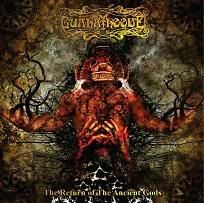 15. Guahaihoque, "Thy Eternal Golden Dawn" (The Return of the Ancient Gods, Xue, 2007, Colombia) - I've long been searching for an exemplary South American, Central American or Spanish folk metal band. Sadly, so many Latin American pagan metal acts draw influence from other cultures, mainly Germanic or Celtic, that I was afraid I might have to dig out a copy of Sepultura's nü-metal compromise Roots for this list. Instead, the Internet led me to Guahaihoque, a Colombian quintet which includes a full-time "ancestral woodwind" player whose arsenal includes a variety of panpipes (siku, zampoña, malta), flutes (quena, quenacho) and ocarina. Their music is mainly your basic melodic black/death, the ghostly winds adding an otherworldly atmosphere to admittedly standard but quite enjoyable melodies. In the future, I hope to see Guahaihoque delve deeper into their pre-Hispanic cultural concept, as they've already got the integration of the instruments down pretty well on their debut. Lyrics in a non-Spanish indigenous language would be sweet.
15. Guahaihoque, "Thy Eternal Golden Dawn" (The Return of the Ancient Gods, Xue, 2007, Colombia) - I've long been searching for an exemplary South American, Central American or Spanish folk metal band. Sadly, so many Latin American pagan metal acts draw influence from other cultures, mainly Germanic or Celtic, that I was afraid I might have to dig out a copy of Sepultura's nü-metal compromise Roots for this list. Instead, the Internet led me to Guahaihoque, a Colombian quintet which includes a full-time "ancestral woodwind" player whose arsenal includes a variety of panpipes (siku, zampoña, malta), flutes (quena, quenacho) and ocarina. Their music is mainly your basic melodic black/death, the ghostly winds adding an otherworldly atmosphere to admittedly standard but quite enjoyable melodies. In the future, I hope to see Guahaihoque delve deeper into their pre-Hispanic cultural concept, as they've already got the integration of the instruments down pretty well on their debut. Lyrics in a non-Spanish indigenous language would be sweet.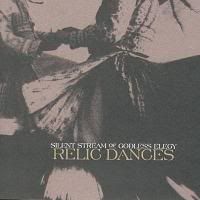 16. Silent Stream of Godless Elegy, "You Loved the Only Blood" (Relic Dances, Redblack, 2004, Czech Republic) - We briefly move away from the blackend sort of ethnic metal for a stop in the land of doom/death. Silent Stream of Godless Elegy is a long-running group with a foundation in the man growling/woman singing dynamic familiar from the gothic doom scene, with violin and cello to augment the tasteful Eurodrama. They inject life into this classy but often dull type of drawing-room metal by steeping it in Moravian folklore. Relic Dances, SSoGE's most recent album, found only founding guitarist Radek Hajda returning. In collaboration with producer Tomáš Kočko, a famous Morovian folk musician, it reached further into ethnic explorations and won the group its second Czech Grammy. This selection is one of its most engaging, and aside from the death growls might seem too upbeat for the death ballad that it is. Considering how accepted they are by their countrymen and how long it's been since they released new material, I imagine SSoGE's next album will eventually go the route of Norway's Lumsk, dropping all but a hint of the metal in lieu of moody ethnic rock.
16. Silent Stream of Godless Elegy, "You Loved the Only Blood" (Relic Dances, Redblack, 2004, Czech Republic) - We briefly move away from the blackend sort of ethnic metal for a stop in the land of doom/death. Silent Stream of Godless Elegy is a long-running group with a foundation in the man growling/woman singing dynamic familiar from the gothic doom scene, with violin and cello to augment the tasteful Eurodrama. They inject life into this classy but often dull type of drawing-room metal by steeping it in Moravian folklore. Relic Dances, SSoGE's most recent album, found only founding guitarist Radek Hajda returning. In collaboration with producer Tomáš Kočko, a famous Morovian folk musician, it reached further into ethnic explorations and won the group its second Czech Grammy. This selection is one of its most engaging, and aside from the death growls might seem too upbeat for the death ballad that it is. Considering how accepted they are by their countrymen and how long it's been since they released new material, I imagine SSoGE's next album will eventually go the route of Norway's Lumsk, dropping all but a hint of the metal in lieu of moody ethnic rock.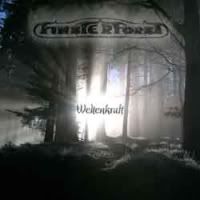 17. Finsterforst, "Traumwald" (Weltenkraft, Worldchaos, 2007, Germany) - Germany is a fertile fountain of folk metal, and that goes back to the likes of Empyrium, Adorned Brood and the big-in-Europe "medieval metal" subgenre (Subway to Sally, In Extremo, etc.). From the southwest comes the septet Finsterforst, who emerged with such a clear and professional vision that they can't possibly remain a secret for long. Their tunes lean toward the most accessible end of black metal, with both keyboards and a real accordion pumping up their beerhall guitar melodies and raspy native-tongue vocals, and often weave pastoral interludes among the otherwise high-energy material. This track ("Dream Forest") from their amazing debut provides jaunty fun as well as an idealized, brooding old-world flavor, appropriately conjuring the Black Forest that both shadowed Finsterforst's upbringing and provided the band’s name. Their recent follow-up, …Zum Tode Hin, is on a very short list of discs I must buy once I gather some spare cash.
17. Finsterforst, "Traumwald" (Weltenkraft, Worldchaos, 2007, Germany) - Germany is a fertile fountain of folk metal, and that goes back to the likes of Empyrium, Adorned Brood and the big-in-Europe "medieval metal" subgenre (Subway to Sally, In Extremo, etc.). From the southwest comes the septet Finsterforst, who emerged with such a clear and professional vision that they can't possibly remain a secret for long. Their tunes lean toward the most accessible end of black metal, with both keyboards and a real accordion pumping up their beerhall guitar melodies and raspy native-tongue vocals, and often weave pastoral interludes among the otherwise high-energy material. This track ("Dream Forest") from their amazing debut provides jaunty fun as well as an idealized, brooding old-world flavor, appropriately conjuring the Black Forest that both shadowed Finsterforst's upbringing and provided the band’s name. Their recent follow-up, …Zum Tode Hin, is on a very short list of discs I must buy once I gather some spare cash. 18. Devil in the Kitchen, "Little Greene Men" (Wizard's Walk, independent, 2006, United States) - I still hold out hope to hear a domestic band who can integrate our traditional music with metal. Iced Earth had slight success with the folkier parts of their "Gettysburg (1863)" trilogy from The Glorious Burden. I'd hoped Across Tundras had invented something fresh, but I can't find the brilliance in their Americana-tinged Isis-core. It is actually the defunct little Boston act Devil in the Kitchen which actually comes closest to what I've envisioned. Entirely devoid of lyrics, their music was a sort of thrash metal/bluegrass/Celtic folk fusion fueled by a frantic fiddle. I'll admit, the beginning of this 2005 demo track (appended to the reissue of their sole CD) sounds like something the turd-gobbling Dave Matthews Band might have come up with. By the end, it's the kind of shit-kickin' masterpiece that I wish I had witnessed live. Devil in the Kitchen is unfortunately no longer with us, but perhaps some members will revive the mission one day. For the time being, bassist Bassil Silver-Hajo drums with awesome Nintendo metallers Powerglove.
18. Devil in the Kitchen, "Little Greene Men" (Wizard's Walk, independent, 2006, United States) - I still hold out hope to hear a domestic band who can integrate our traditional music with metal. Iced Earth had slight success with the folkier parts of their "Gettysburg (1863)" trilogy from The Glorious Burden. I'd hoped Across Tundras had invented something fresh, but I can't find the brilliance in their Americana-tinged Isis-core. It is actually the defunct little Boston act Devil in the Kitchen which actually comes closest to what I've envisioned. Entirely devoid of lyrics, their music was a sort of thrash metal/bluegrass/Celtic folk fusion fueled by a frantic fiddle. I'll admit, the beginning of this 2005 demo track (appended to the reissue of their sole CD) sounds like something the turd-gobbling Dave Matthews Band might have come up with. By the end, it's the kind of shit-kickin' masterpiece that I wish I had witnessed live. Devil in the Kitchen is unfortunately no longer with us, but perhaps some members will revive the mission one day. For the time being, bassist Bassil Silver-Hajo drums with awesome Nintendo metallers Powerglove.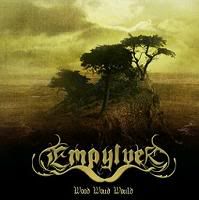 19. Empylver, "Old Boy" (Wood Woud Would, Dying Empylver, 2006, China) - Wish I could tell you more about A.J. Alex and his one-man band Empylver, which has to date self-released one CD and an EP that includes covers of score cues from "Spirited Away," "The Piano" and "Forrest Gump." The album offers a transfixingly odd melange of lush folk, soft rock, light classical, nature sounds and harshly distorted black/doom metal. Due to its reclusive creator's English name and lyrics, as well as his general preference for European melodies, I can't really posit Empylver as a representative of native Chinese folk metal. However, the combination of wispily-applied, organic non-metal instruments (flute, violin, accordion and more) with the charming bedroom black metal ambience of sizzling guitar fuzz and drum machine offers a unique and ethereal feel that makes the project worth investigating. From what I can make out of the lyrics of this tune, it's not about the Park Chan-wook film.
19. Empylver, "Old Boy" (Wood Woud Would, Dying Empylver, 2006, China) - Wish I could tell you more about A.J. Alex and his one-man band Empylver, which has to date self-released one CD and an EP that includes covers of score cues from "Spirited Away," "The Piano" and "Forrest Gump." The album offers a transfixingly odd melange of lush folk, soft rock, light classical, nature sounds and harshly distorted black/doom metal. Due to its reclusive creator's English name and lyrics, as well as his general preference for European melodies, I can't really posit Empylver as a representative of native Chinese folk metal. However, the combination of wispily-applied, organic non-metal instruments (flute, violin, accordion and more) with the charming bedroom black metal ambience of sizzling guitar fuzz and drum machine offers a unique and ethereal feel that makes the project worth investigating. From what I can make out of the lyrics of this tune, it's not about the Park Chan-wook film.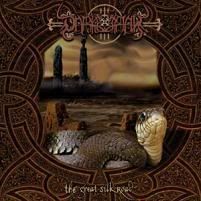 20. Darkestrah, "Cult Tengri" (The Great Silk Road, Paragon, 2008, Kyrgyzstan) - Like the core members of Israel's Melechesh, vocalist Kriegtalith and drummer Asbath of Kyrgyz folk/black metal act Darkestrah relocated to a more metal-friendly country, in their case Germany. There, they picked up band members and shifted from blatantly anti-religious material to the nature- and culture-focused stuff they perform today, although hampered by their former record label's low profile and neo-Nazi stigma (Darkestrah is completely apolitical). Last year's epic debut for American label Paragon explores the grandeur and danger of the ancient Asian trade route known as the Silk Road, the same pancultural conduit examined in a more genteel manner by Yo-Yo Ma. Synths and cello flavor the churning, hypnotic melodies, along with temir komuz (Kyrgyz mouth harp) and throat singing, the latter performed by Kriegtalith alongside her raspy shriek. The title of this relative short yet gigantic number, which features a guest mandola player, refers to the great sky deity of Central Asia.
20. Darkestrah, "Cult Tengri" (The Great Silk Road, Paragon, 2008, Kyrgyzstan) - Like the core members of Israel's Melechesh, vocalist Kriegtalith and drummer Asbath of Kyrgyz folk/black metal act Darkestrah relocated to a more metal-friendly country, in their case Germany. There, they picked up band members and shifted from blatantly anti-religious material to the nature- and culture-focused stuff they perform today, although hampered by their former record label's low profile and neo-Nazi stigma (Darkestrah is completely apolitical). Last year's epic debut for American label Paragon explores the grandeur and danger of the ancient Asian trade route known as the Silk Road, the same pancultural conduit examined in a more genteel manner by Yo-Yo Ma. Synths and cello flavor the churning, hypnotic melodies, along with temir komuz (Kyrgyz mouth harp) and throat singing, the latter performed by Kriegtalith alongside her raspy shriek. The title of this relative short yet gigantic number, which features a guest mandola player, refers to the great sky deity of Central Asia.

